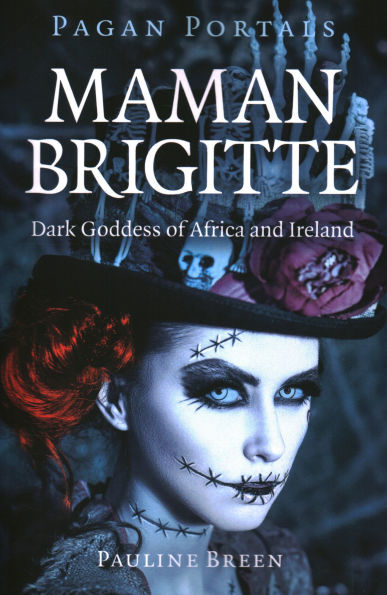Pauline Breen writes about Maman Brigitte, an important goddess of Vodou, without having any experience of Haitian Vodou or New Orleans Voodoo, by analogy to her experiences as a devotee of the Irish Brigit and as a Goddess spirituality and New age practitioner. So, there is much poetic description, much invocation of the Great Mother Goddess and Perennial Philosophy that does not see the particularities of Vodou. She does recognize the hybrid experiences of Haiti which brought forward Maman Brigitte, with the Irish sold as indentured servants alongside the African slaves, the hardships and history.
But she misunderstands the cultures she’s talking about – there is no Universal Great Mother Goddess in Yoruba culture, which she argues as the origin of Haitian Vodou, for one thing. And a key to Haitian Vodou is that several nations’ people were enslaved and transported to there, not only the Yoruba, and so they evolved a hybrid religion which included not just African ideas but also Catholicism.
She does provide a decent quick summary of a history of Haiti and of beliefs and practices of Vodou. But gathered the information from Youtube videos! No wonder it reads like a breathless “here’s some cool stuff I learned” conversation with an enthusiastic student rather than a researched work of scholarship. Awkward writing, unfortunately. Evocative discussion, and she is honest in providing qualifiers about the limits of her research and experience. Lots of UPG (Unverifiable Personal Gnosis) throughout.
From a discussion of Vodou in Haiti to a discussion of Louisiana – there was an influx of Haitians right after their revolution to New Orleans. She argues that an important shift in New Orleans was shifting from male domination to a matriarchal approach in Voodoo. She gives a history of the Irish immigration to NO but does not give evidence that it influenced Voodoo there or that Irish Catholic ideas of St. Brigit fed into the Voodoo ideas of Maman Brigitte. She gives a brief history of the waves of Irish immigrants, including many Irish enslavers.
The total of her direct research into New Orleans Voodoo appears to have been a tourist trip to Louisiana in 2023 and an interview with the Priestess running a Voodoo supplies store.
Her third chapter on Brigitte in Today’s World is largely a quick grimoire sketch. She begins with a quick listing of areas of concern she associates with Brigitte and a paragraph on each: Abandonment, Ancestral Healing (“cellular memory”), Death, Detachment, Displacement, Fear, Finding Your Voice, Gratitude, Grief, Homelessness, Loss, Loss of Self, Maternal Issues, Overshadowing, Persecution, Protection, Shadow Work, Slave to Routine, Strength, Survival, Thriving. Then a section on colours associated with her, one on animals, one on symbols, days, offerings, and how to connect with her (I would have to say that having some experience with Vodou would have been a real help here!).
“Who is Brigitte? For me she is authenticity…” (pg. 82) But it is an authenticity that she is trying to conjure up out of nothing.
There are parallels and similarities and there is no doubt that Brigit and Brigitte draw from some shared sources. I would not call them the same goddess (but I am more strongly polytheist), but this is potentially a very interesting discussion that really went nowhere.
I have to say that I was very disappointed in this book. Typically, Pagan Portals books are better than this one. It reads as very unfinished, with loads of UPG and very poorly developed connections between her ideas. It's an interesting premise, and perhaps someone with deeper scholarship and knowledge will give us a better version, some day.
~ review by Samuel Wagar
Author: Pauline Breen
Collective Ink, 2024
105 pg. Paperback £9.50 / $17 Can / $12 US

